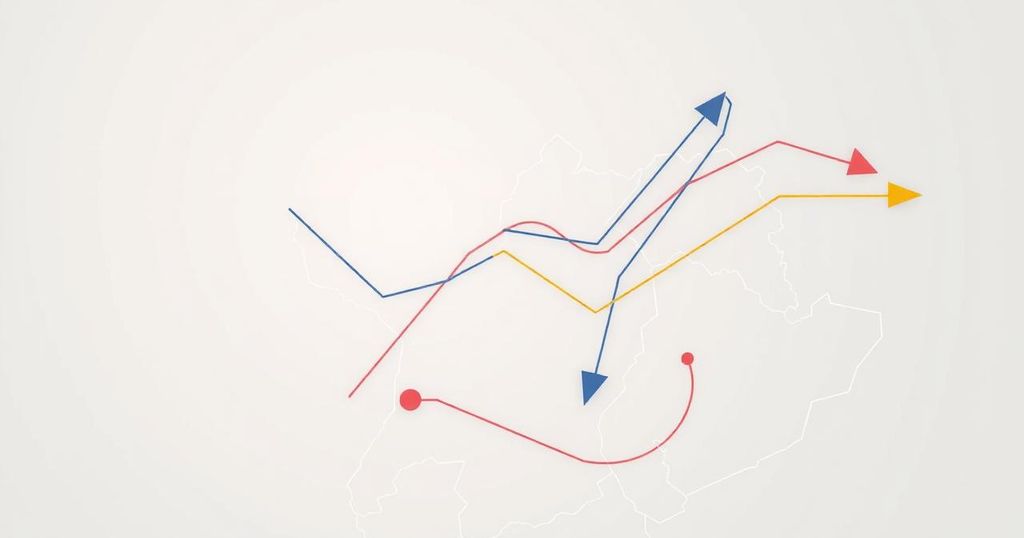Regional Concerns: Egypt and Jordan Reject Trump’s Plan for Gazan Relocation

President Trump’s suggestion to relocate Palestinians from Gaza to Egypt and Jordan has faced significant backlash from both countries. Regional leaders fear that such a move could destabilize their nations and provoke public unrest. Egypt’s President el-Sisi and Jordan’s King Abdullah II have articulated their strong opposition, emphasizing the importance of preserving Palestinian rights and the dangers of demographic upheaval amid historical tensions.
U.S. President Donald Trump has proposed relocating Palestinians from Gaza to neighboring countries like Egypt and Jordan, a move seen as radical by regional leaders. Despite the apparent rationale behind evacuation in conflict zones, this idea clashes deeply with the widely held belief that Palestinians should not be forcibly displaced from their homes, an essential aspect of the Palestinian cause. Responding to Trump’s suggestion, Egypt and Jordan united with other Arab states to express their strong opposition to the proposal, fearing it could destabilize the region and exacerbate the conflict.
Egypt’s President Abdel Fattah el-Sisi has openly criticized the move, indicating it poses a threat to Egypt’s national security. He highlighted that Gaza’s residents, if driven to Egypt, could engage in hostilities against Israel, jeopardizing the peace agreement in place. El-Sisi acknowledged the real concern that this influx would spark unrest among Egyptians, further endangering his regime. The presence of thousands of potentially radicalized individuals from Hamas, an offshoot of the Egyptian Muslim Brotherhood, he believes, would embolden opposition to his government.
In Jordan, King Abdullah II finds himself navigating a delicate balancing act. With a significant portion of Jordan’s population identifying as Palestinian, the influx of more Gazans could provoke unrest and challenge the monarchy’s stability. Historical tensions between the Jordanian state and Palestinian groups also contribute to the reluctance for any significant settlement of Palestinians on its soil. The king has publicly distanced Jordan from the notion of accepting displaced Palestinians, reaffirming that “Palestine is for the Palestinians.”
Both Egypt and Jordan’s opposition stems from significant risks to their internal stability and a desire to avoid repeating historical conflicts linked to Palestinian migration. While the dynamics of the Israeli-Palestinian situation remain precarious, their denouncement of Trump’s vision illustrates a strong regional stance against any proposal that may undermine the long-standing Palestinian claim to their homeland. Despite fierce objections, Trump believes that the leaders might eventually concede to his views, potentially seeking concessions or assistance from them in response.
In conclusion, the proposal to relocate Palestinians, while intended as a solution, faces staunch opposition from key regional players, rooted in fears of destabilization and historical complexities. Both Egypt and Jordan emphasize the importance of keeping Palestinians in their homeland as a foundation for peace, as any demographic upheaval could threaten their regimes. It remains essential for international dialogue to respect these sentiments and explore more sustainable paths toward resolution in the region.
The proposition by President Donald Trump to transfer Palestinians from the Gaza Strip to Egypt and Jordan has sparked significant concern among these neighboring countries. With a long history of conflict over Palestinian rights and the stability of regional regimes, their rejection of this idea is emblematic of deeper sentiments surrounding the Palestinian cause. The proposal raises questions of national security and stability within Egypt and Jordan, both of which have complex relationships with their Palestinian populations. The region has a longstanding history of tensions regarding Palestinian displacement, particularly relating to the influence of groups like Hamas and the political instability that can arise from significant demographic changes, particularly in Jordan, where the population is heavily composed of individuals identifying as Palestinian. The reaction against Trump’s suggestion highlights both diplomatic solidarity among Arab states and the nuances of regional politics that complicate such proposals, illustrating that solutions must be sensitive to historical grievances and current realities.
In summary, the rejection of President Trump’s proposal to relocate Gaza’s Palestinians reflects a broader concern about the repercussions on regional stability, national security, and historical context. Egypt and Jordan’s unified stance underscores a commitment to upholding Palestinian residency rights. The potential risks of demographic shifts associated with such plans could lead to significant unrest in both countries, further emphasizing the complexity of the Israeli-Palestinian conflict and the need for careful consideration of local sentiments in future peace initiatives.
Original Source: allisrael.com








